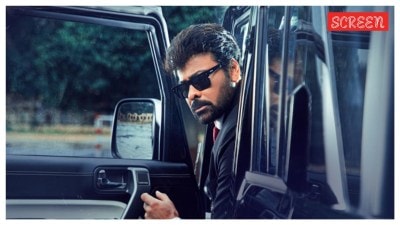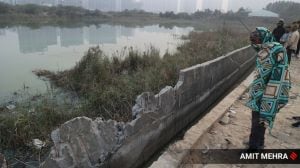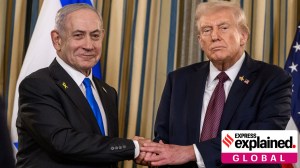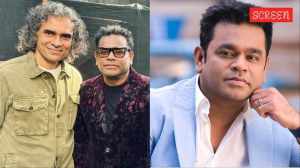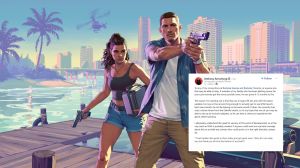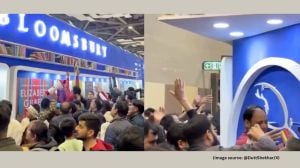Wide Angle
Where is the New Delhi twist?Supposing Indian exertions were primarily responsible for the tough language at CHOGM against the military r...

Where is the New Delhi twist?
Supposing Indian exertions were primarily responsible for the tough language at CHOGM against the military regime in Pakistan, including a call to release quot;Prime Ministerquot; Nawaz Sharif, would the deposed premier8217;s relatives and friends have been beholdens to New Delhi?
When Worldview India8217;, DD8217;s international affairs programme, called up Hasan Sharif Nawaz Sharif8217;s son in London, this is what he had to say:quot;I welcome the hardline stance and ethics of the world community and specially the UK and Commonwealth nations that they have taken a principled stand for democracyquot;.
Question: But India was very much in the lead urging for the restoration of democracy. You8217;ve mentioned UK. How do you react to India8217;s principled stand?quot;I am staying outside Pakistan for five years and I think this is a 8230;. very8230;.sort of domestic problem for India that how it reacts to what8217;s been happening in Pakistanquot;.
Question: There was a story that you had appealed to Prime Minister Vajpayee, then later you vehemently denied the story. Vajpayee did make very constructive suggestions at Durban for the restoration of democracy in Pakistan.
quot;I never appealed specifically to Prime Minister Vajpayee and I want to be very loud and clear that I did not make any such appeal. I don8217;t think there is a need to do that. I think Pakistani people will make sure that there is no harm being done to Nawaz Sharif. They are more than enough for mequot;.
This is a quintessential Pakistani response, in fact the response of anyone who seeks the support of the Pakistani establishment to any goodwill gesture from India. To respond positively to an Indian goodwill gesture is to undermine in the eyes of the Pak establishment as distinct from the people the very raison d8217;etre of the Pakistani state.
Democracy in Pakistan, to be meaningful, must be preceded by a referendum on quot;should Pakistan have friendly ties with India?quot; Only the outcome of some such referendum can defeat the deeply entrenched Pakistani establishment.
The meeting of the eight members Commonwealth Ministerial Action Group CMAG in London soon after the October 12 coup in Pakistan had more or less sealed the fate of that country. Canadian foreign minister, Lloyd Axworthy had told me at Marlborough House that, in the absence of any timetable for elections, there was no alternative but to suspend Pakistan from the Commonwealth. Even before the four Foreign Ministers, with Axworthy as leader, made their fact-finding visit to Islamabad, it was more or less clear that Pakistan would initially be expelled only from the Councils of the Commonwealth. Which means it will not be allowed to attend Commonwealth meetings, including CHOGM, but it would still be deemed to be a member of the Common-wealth.
Even at that stage the view among some members was that any harsher action would cause Pakistan to quot;leavequot; the Commonweaalth. Such an eventuality would deny the grouping any further leverage on Pakistan8217;s military. In fact this exactly was Commonwealth Secretary General Chief Emeka Anyaoku8217;s argument at Durban. The surprising realisation at CHOGM was the exceptionally strong sentiments against military coups across Africa and the Caribbean.
When I asked Nigeria8217;s President Obasanjo what sort of punishment should be meted out to Pakistan, he pulled back no punches. quot;Punishment to Pakistan should be no less than the punishment that as given to Nigeria8217;s military rulersquot;.
Britain8217;s Robin Cook clarified the picture, quot;President Obasanjo is right, but in the first instance even Nigeria was only suspended from the Councils of the Commonwealthquot;. Suspension from the Commonwealth followed only when the Nigerian regime showed no movement towards democracy. quot;So further action against Pakistan is very much on the tablequot;.
By all accounts, one of the most moving speeches on the subject was made by Sheikh Hasina. quot;My father, my ten-year old brother were all killed in Dhaka. That is the memory I have of military coupsquot;.
Prime Minister Atal Behari Vajpayee8217;s intervention was, by general consensus, brief and elegant. The Millbrook action programme on the Harrare declaration stipulates quot;upto two years as the ti-me frame for the restoration of democracy where the institutions are not in place to permit the holding of elections within, say, a maximum of six monthsquot;. Vajpayee gently pointed out that the institutions for holding elections were in place in Pakistan.
It is actually the strength of feeling across the board, particularly among African countries, that was reflected in the Durban communique.
quot;Heads of government condemned the unconstitutional overthrow of the democratically elected government in Pakistan. They believed that no legitimacy should be accorded to the military regime and called for the restoration of civilian democratic rule without delay.quot; Notice, no deadlines here. Immediate action is sought.
Also, quot;recognising the unconstitutionality of the regime, heads of government urged that Prime Minister Nawaz Sharif and others detained with him be released immediatelyquot;.
Where, pray, is the quot;twistquot; given to the communique by New Delhi as the Pakistan foreign office alleges?
- 01
- 02
- 03
- 04
- 05


